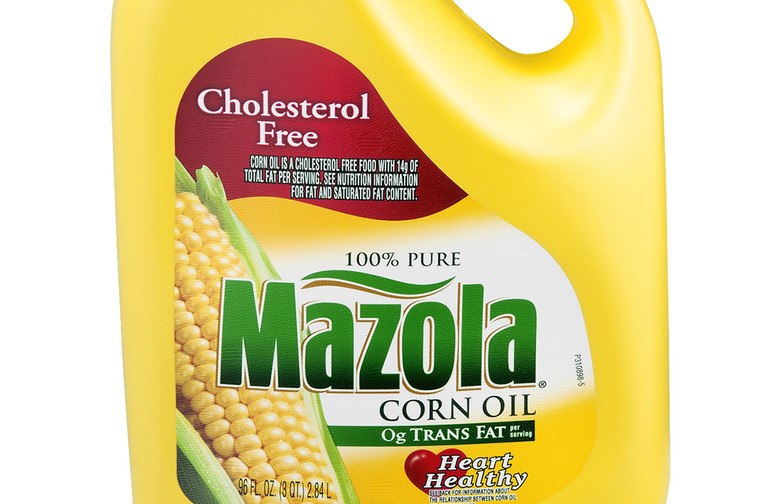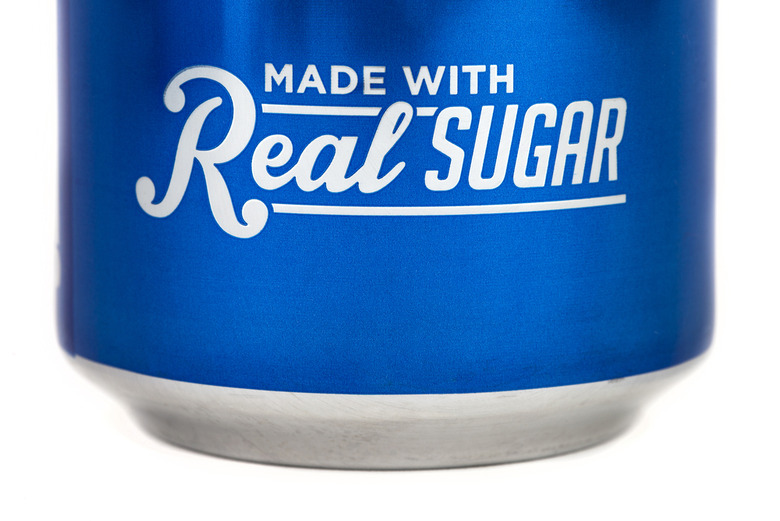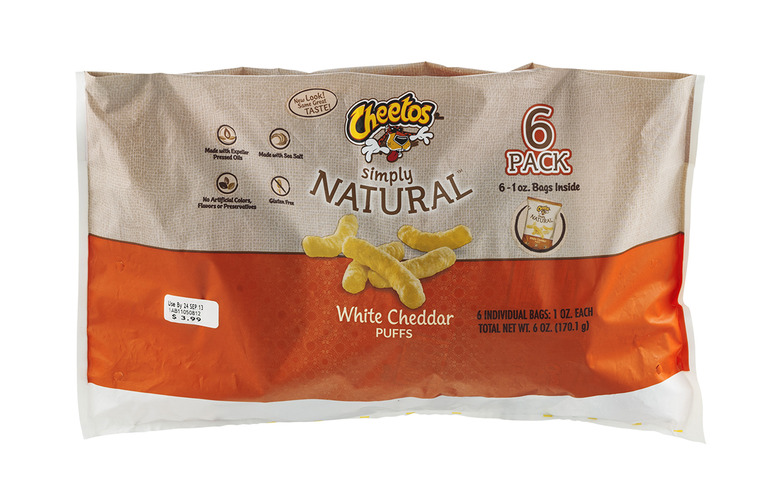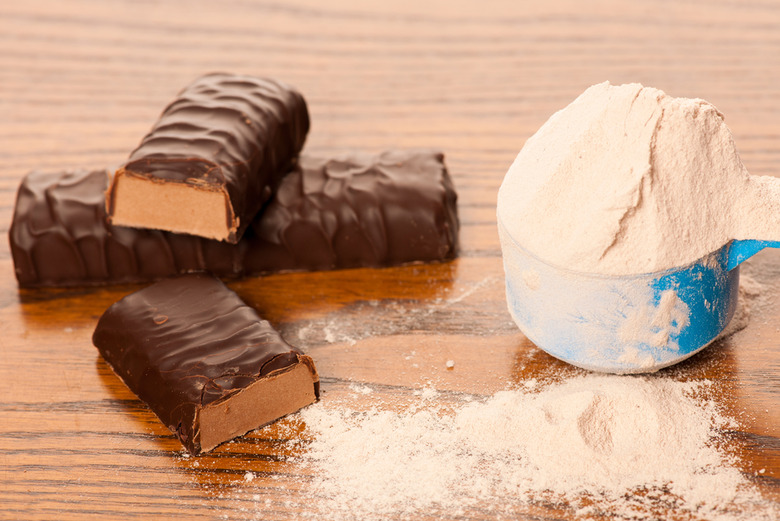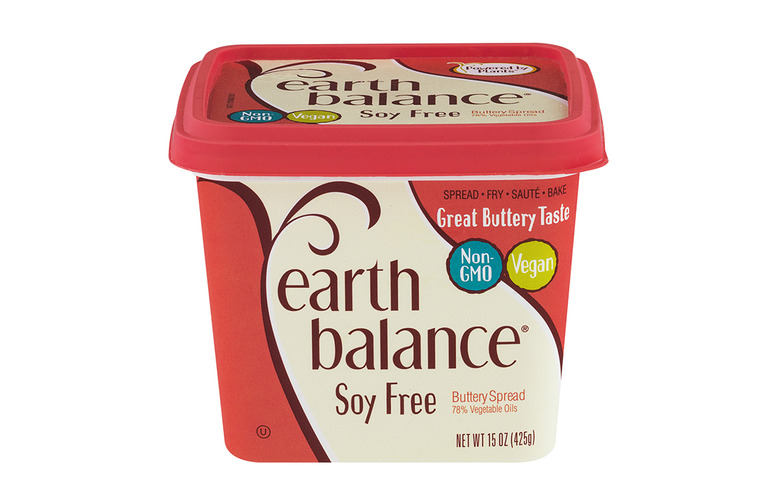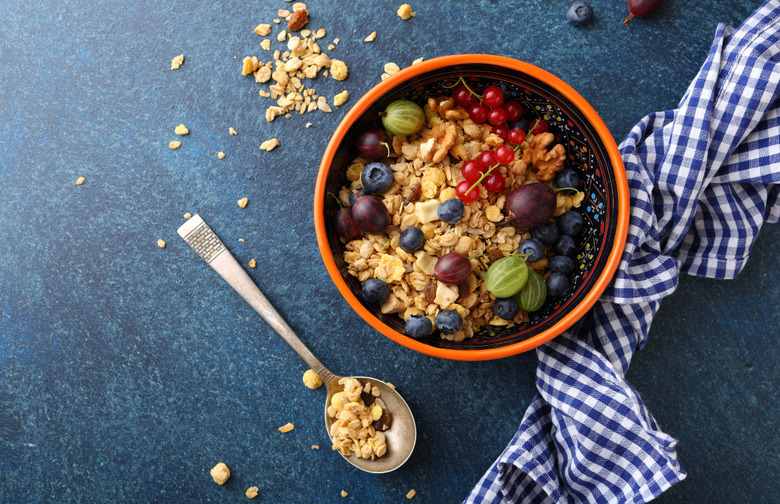25 Food Labels That Have You Fooled Slideshow
These days, products are trying to outperform each other from any and all angles. The simple task of choosing a breakfast cereal has become marred with a swarm of advertisements and flashy claims about health on the front of products' boxes. Are those chocolate-stuffed squares really a good source of fiber? Are those rice crisps that turn your milk a creamy cocoa really made of healthy whole grains?
Often, these labels are there to fool you into thinking that a product is the healthier choice when in actuality, there's not much that's healthy about it. Marketers are smart. They use buzzwords and promises they know you're looking for and find loopholes in federal regulations to make things sound better than they actually are.
The best way to ensure you're buying a healthy product is to check the nutrition facts and the ingredients — both of which provide valuable information about your health, if you know how to read them right. But sometimes, you don't have the time or energy to scour over the numbers and fine print.
We're here to help you decode those attention-grabbing declarations and crack the code of product marketing. It can become much easier to see through all that misleading information once you know which labels have you fooled.
100-Calorie
We seriously wish 100-calorie snack packs had stayed in the early 2000s where they belong. But unfortunately, packaging boasts of low, 100-or-less calorie numbers are still thriving in supermarket aisles.
Just because something has a meager 100 calories doesn't make it healthy. Often, snacks of 100 calories or less are filled with excess artificial ingredients and additives to make them taste good without adding nutritional value. Nutritional value, such as the kind that comes from carbs, fats, and protein, results in some calories. Calories that, of course, those calorie-label-reliant companies don't want.
Calories are, quite literally, energy from food. So if you're eating a low-calorie snack, it's probable you'll need another soon after. We'd rather eat a high-calorie, nutritious snack than a low-calorie one with 30 ingredients to its name.
12-Grain
One grain, two grains, three grains... These breads managed to add in 12! But that doesn't mean that they didn't also add in a ton of other, stuff, too. Many have refined white flour as a main ingredient — perhaps not the healthiest choice.
You can add as many grains in as tiny of a quantity as you want into a loaf of bread and still boast this label. Are the grains whole grains? That remains unspecified. Is there added sugar? Also information that isn't as blatantly relayed. Check the ingredients on your bread and look for varieties with whole grains as the first few ingredients.
50 Percent Less Fat
This is a horrific claim to see on peanut butter. Ask any dietician. Yet, they're out there — products marked somehow "better" than peanut butter, made out of peanuts with half the fat removed. There are two things wrong with this.
Firstly, the reason peanut butter is so good for you is due to its supply of healthy fats. Why would you want them removed?
Secondly, to make those products taste good, the manufacturers add in a whole slew of other ingredients, often including processed oils, chemicals, and sugar. No, thank you. I'd rather eat the fat!
A Good Source of Fiber
What constitutes "good"? Not much. According to the Food and Drug Administration, a food only needs to have 10 percent of your daily recommended intake to qualify. Additionally, the type of fiber remains a mystery. Often, companies use isolated fiber instead of real fiber — which boasts little to no nutritional benefit. Try a natural, whole food with fiber for a more reliable source.
Calling Something “Water”
Companies give their bottled drinks the qualifier "water" to make the beverage sound healthier. But this title is essentially meaningless.
A great example of this travesty is Vitamin Water. This "water" is a whole lot more than just water and vitamins, despite the implication of the name. It's also cane sugar, taurine, fructose, and chemical preservatives. Is soda considered "water," too, since it's one of the main ingredients? Can we start calling ice cream "milk"?
Cholesterol-Free
The panic around cholesterol is suspected to be unfounded. According to Deborah Beauvais from the Academy of Nutrition and Dietetics, cholesterol is "essential to human health and cell-building." And regardless of whether or not cholesterol is harmful, "a food claiming to be low in cholesterol or cholesterol free does not mean the food is fat free. Vegetable oils contain no cholesterol, but they are 100 percent fat."
Putting "cholesterol-free" on labels of food that wouldn't, naturally, contain cholesterol is like labeling a gallon of milk "peanut-free." Of course it is — but that shouldn't influence your decision to buy it.
Dairy-Free
Lately, dairy-free ice cream has been all the rage. Health enthusiasts and fad-following teenagers are cutting dairy from their diets in the belief that it makes them healthier. However, there has been a huge amount of controversy over whether or not dairy is actually harmful to your health. We do know that dairy supplies a necessary dose of calcium, which many Americans are deficient in.
Dairy-free ice cream in particular is often worse for you, nutritionally speaking, than the cream-based kind. Instead of dairy, the companies infuse the dessert with more sugar, coconut oil, and corn syrup to mask the deficiency. That means it has all the sugar and saturated fat but none of the protein. Swapping out dairy for health reasons is kind of a nutritional fail.
Doctor-Recommended
Who are these doctors? Answer: Literally anyone. Additionally, it doesn't say why that doctor recommended the product. The doctor could have just thought the product tasted good and reported that anecdotally.
We are also left to wonder: What kind of doctor? If a podiatrist recommended a candy bar, does that claim still hold the same weight? Most doctors — with the exception, of course, of dieticians — are only required to take one basic nutrition course throughout their education. That podiatrist has little more expertise than anyone else you met on the street.
Farm-Raised or Pasture-Raised
According to Consumer Reports, there are too many variables involved in defining what deserves the label "pasture-raised", and so there is no legal definition. This label is utterly meaningless.
Free Range
The industry standard definition for "free range" is allowing birds outdoor access for five minutes per day. Five. Minutes. Additionally, "outdoor access" can mean access through a tiny hole in a cage that doesn't allow even a semblance of full body freedom. The cold, hard truth is that free range is a term tossed around with the most meager standards for animal care.
Gluten-Free
The number of products with the label "gluten-free" is getting a bit ridiculous. Products that never contained gluten in the first place, such as almond butter, potato chips, and even canned vegetables are donning the title — and being perceived as healthier as a result. Gluten-free doesn't mean healthy.
Guilt-Free
Says who? Labeling a product "guilt-free" is a warning sign that there wasn't another "healthy" sounding label to tack on. No food really needs to cause any guilt — all foods can be guilt-free. In fact, guilt-free, intuitive eating is the healthiest there is. And it involves any and all foods, in the moderation you desire.
Low-Sodium
Salt is actually really good for you — it's great for hydration, making food taste good, and so much more. Buying a product that's low in sodium over a product made with sodium doesn't have a whole lot of health benefit, and can actually result in some unsavory side effects like sodium deficiency if you restrict salt intake to the extreme.
Made With Real Fruit
Yes, it's made with real fruit, but what else is it made with? Gummies, for example, often contain trace amounts of fruit for flavoring but are also chock full of added sugars and chemical compounds. Again, let's parallel this with ice cream — it's made with real milk! But that doesn't make it milk.
You're better off eating the fruit itself, rather than a product that's made with it.
Made With Real Sugar
It sure, is — soda is made with real sugar! And lots of it. Remind us why that makes it a health food, again?
Made With Sea Salt
Both sea salt and table salt have the same amount of sodium — the notion that sea salt is healthier is a health myth. The sole benefit of using sea salt over table is the difference in texture. If you love the authentic, grainy feel, then opt for sea salt! But if you're doing it for the health cost, save yourself the extra dollar from the marked-up price.
Made With Whole Grains
Again, we run into the caveat of "made with." What else is it made with? Why don't they list all of the ingredients in such large print on the front of the package? They could literally drop a whole-grain breadcrumb into their recipe and give it this label.
Natural
"Natural flavors" can be any number of flavorings — and can, counterintuitively, include unnatural ingredients. Essentially, the Food and Drug Administration's regulations for the term are loose, making the use of the term on labels and ingredients a total lie.
No Added Hormones
Here's some good news: None of the foods (with the exception of beef) that are sold in supermarkets are made with hormones. The government prohibits the use of hormones in the production of all other meat products, so if a product brags of this restriction, they're really just telling you that they, like all other products on the shelves, are following the law.
Fortified With Omega-3s
Often, when companies fortify their foods with omega-3s, they're just taking ground flax seeds and sprinkling them all over their product. Flax seeds have a type of omega-3 called ALA, which doesn't result in the same heart-healthy benefits as the other types. Any company can add even the tiniest portion of the less-beneficial ALA to their food and boast this label, making it utterly meaningless for your health. We'd rather get our omega-3 fatty acids from other, more natural sources.
Protein
Manufacturers of "healthy" cereal and granola bars have been fooling moms and other consumers with their "protein" versions of products for quite some time. If you're buying a "Protein" Fiber One bar, you're still buying the sugar, additives, and fake sweeteners that come with any other variety. Plus, these bars often offer scant amounts of protein, even in their protein-marketed products.
A good way to tell if something has the protein you're looking for is to read the nutrition label. Look instead for bars with eight grams of protein or more; they'll actually provide you with the nutritional benefit those labels promise but don't deliver.
Soy-Free
This label is useful only for consumers who are allergic to soy. If you aren't allergic, there's nothing about the ingredient that's unhealthy. Soybeans actually contain a ton of nutrients, including manganese, selenium, copper, potassium, phosphorus, magnesium, iron, and more.
Sugar-Free
Sure, it's sugar-free, but is it chemical-free? Sucralose-free? Free of cancer-causing sweeteners? Probably not. If it's sugar-free, it's got to be sweetened with something else.
In other cases, sugar-free gets thrown on the labels of foods that shouldn't really be sweetened at all. For instance, it's been spotted on the labels of savory salad dressings, canned goods, and crackers.
Superfood
Here's a news flash: Superfoods are any food that have a good amount of nutritional value. So, anything containing blueberries can boast superfood status. Granola that's fluffed with fat, sugar, and a few dried fruits falls under the umbrella term. So does trail mix. And pies.
Sorry. Your superfood blend doesn't make your dessert a healthy choice.
Zero-Calorie
According to FDA regulations, a company is allowed to put a big fat zero on a label if the actual number is five or less. We bet you've been wondering how oil spray can boast zero calories truthfully — it can't. The fourth of a second of spray is actually just a tiny enough measure of time to deliver less than five calories worth of oil.
Other zero-calorie foods and beverages — like, for instance, diet soda — are loaded with chemicals, artificial sweeteners, and other additives. All of these non-food ingredients are worse for your health in the long run than a few extra calories — calories that your body need to, you know, continue living your life.
We're just saying to be careful with your artificial sweeteners. They could be doing more harm than good.






